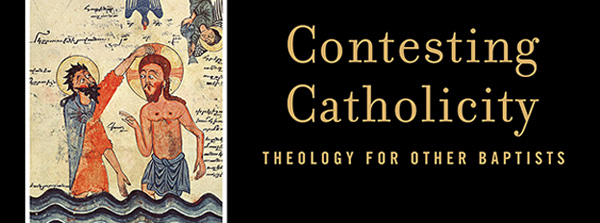 I picked up one new book at the ANZATS Conference this year, which is something of a record (to buy only one…)! The book by Curtis Freeman is entitled, Contesting Catholicity: Theology for Other Baptists. Freeman is Research Professor of Theology and Director of the Baptist House of Studies at Duke Divinity School. The term “other Baptists” comes from a list of Baptist statistics, in which various Baptist denominations were named. The final category in the statistical list was “Other Baptist.” As he reflected on the list, he realised that he belonged to that category of “Other Baptists,” which he defines as neither conservative nor liberal. Here is a paragraph from the Preface of the volume:
I picked up one new book at the ANZATS Conference this year, which is something of a record (to buy only one…)! The book by Curtis Freeman is entitled, Contesting Catholicity: Theology for Other Baptists. Freeman is Research Professor of Theology and Director of the Baptist House of Studies at Duke Divinity School. The term “other Baptists” comes from a list of Baptist statistics, in which various Baptist denominations were named. The final category in the statistical list was “Other Baptist.” As he reflected on the list, he realised that he belonged to that category of “Other Baptists,” which he defines as neither conservative nor liberal. Here is a paragraph from the Preface of the volume:
This book offers a theology for other Other Baptists. It is part diagnostic and part therapeutic. The diagnosis is that many Baptists and other Free Church Christians are suffering from a condition that if left untreated results in death. This sickness did not happen all at once. It was gradual. Nor are the signs of its pathology obvious. They are silent and often unnoticed. Yet the result is deadly. The remedy for this sickness unto death (John 11:4) is the life that is really life (1 Tim 6:19). This life is not the product of human creativity. It is God’s own life, and its curative power is realized by participating in the fellowship of the Father, through the Son, in the Spirit, with the saints. [What a great line; just sayin’…] This is the life of the world. In a word the cure lies in the rediscovery of catholicity. Baptist Christians are more familiar with dissent than catholicity, but, as I show, the way of recovery comes by embracing a mode of being in which contestation and catholicity are not opposites but are instead complementary and necessary for the church to be the church.
Freeman wants to chart a course between the Scylla of conservatism and the Charybdis of liberalism, “toward a generous orthodoxy,” along the way of postliberalism—Duke is not far from Yale after all, and Hauerwas is also at Duke! The chapter titles show the outline of his theology, especially in Part II. He deals with matters of the triune God, the priesthood of all believers, the gathering of the believers in Jesus’ name, light from Scripture, evangelical sacramentalism, and a final chapter entitled, “One Lord, One Faith, One Baptism.” His ultimate aim to be remain a Baptist Christian, but a Baptist within the “one, holy, catholic, and apostolic church.” I don’t know when I will have time to read this, but I am looking forward to doing so, and will blog it as I do.